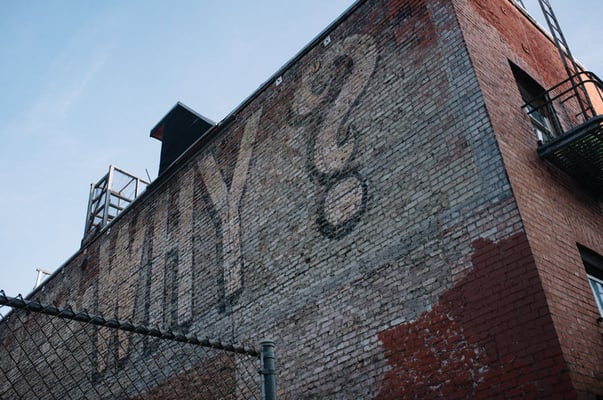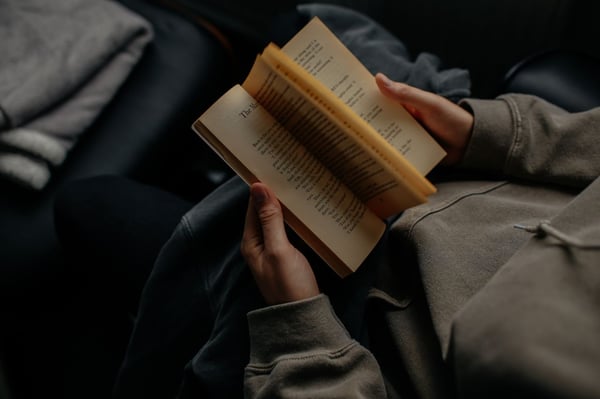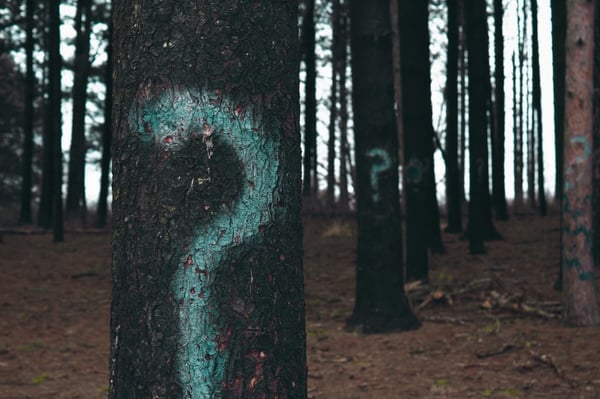by Michael Lydon

Do you think you can end a piece of writing with a question? How would you do it? Why would you do it? Is trying to do it a silly idea? A pointless challenge?
I, for one, don’t think so. Ending a poem, a short story, a novel, or an essay with a question can be a valuable technique, not one to be over-used, but one to be held in reserve for just the right moment. Here, for instance, the ending of Jennie Gerhardt, a tender, magnificent novel by Theodore Dreiser:
Jennie did not hear that or anything else of the chatter and bustle around her. Before her was stretching a vista of lonely years down which she was steadily gazing. Now what? She was not so old yet. There were those two orphan children to raise. They would marry and leave after a while, and then what? Days and days in endless reiteration, and then—?
Jennie, who is asking these pregnant questions, finds herself suddenly facing a blank, uncertain future. All she can see ahead of her is an endless cycle of days following nights following days following nights seemingly ad infinitum.
Look at the two words, the seven ordinary letters, in the middle of this quoted passage: Now what? They ask a profound question, one that we all face with Jennie, and that none of us will ever be able to know the answer to with certainty.
Here we are, it’s now. We may be sitting in a chair in our kitchen; we feel a tiny itch in our nose, we scratch it. We hear the faint shrooph of a car going by. A floating cloud darkens the light coming in the window; will it soon start to rain? Maybe, maybe not. What will happen next? A bird lands on a branch, cheeps a sentence or two in bird talk we don’t understand, then flies away.
Life like that, always now and always new, the future always unknown: these are foundation facts of human life that will never change, no matter who we are, where we are, or when we are. Now what?…now what?…now what?…now what?…..

The philosophy underlying the timeless now-what question has long fascinated me—years ago I named one of my books “Now What?”, citing the universal question as universal proof of human equality—we’re all in the same boat! I’ve also been fascinated by the grammar of the question. If we write, for example,
John walked to the store.
—we are communicating something we know to someone who may not know where John walked. If we write,
Did John walk to the store?
—we are communicating that we don’t know where John walked but we hope the person we are asking will tell us.
Asking a question leaves us in suspense; getting an answer ends the suspense until we ask a new question. Dialogue that gets that back and forth bounce is sure to have a balanced vitality that readers enjoy. Read “The End” by Hanan Adi from Germany, and I think you’ll see what I mean:
I met him at the end of the war and the world. Amid dust and smog and fluttering debris. Amid the reek of dry blood and ash and death. Amid silence. We must have been the last two survivors on Earth.
“What have we done?” he murmured, gazing wide-eyed across the moonscape.
I scuffed a piece of shrapnel. “We got angry, I guess.”
“Everything’s gone…”
“Yeah.”
“What do we do now?”
“Don’t know… Start over, I guess.”
We looked at each other.
“What’s your name?” he asked.
“Dawn,” I said.
“May I call you Eve?”
Shakespeare uses this immortal strand of questions to effect in Shylock’s monologue from The Merchant of Venice.
I am a Jew. Hath not a Jew eyes? hath not a Jew hands,
organs, dimensions, senses, affections, passions? fed with
the same food, hurt with the same weapons, subject
to the same diseases, healed by the same means,
warmed and cooled by the same winter and summer, as
a Christian is? If you prick us, do we not bleed?
if you tickle us, do we not laugh? if you poison
us, do we not die? and if you wrong us, shall we not
revenge?

Questions are less popular than declarative sentences as endings to pieces of writing because most often most people like endings that conclude with a firm, grounded power:
The Prince and the Princess got married on a beautiful sunny day and lived happily ever after in their beautiful castle by the sea.
Yet we all know that life is not perfectly predictable, so we also like songs and sayings with off-kilter endings that leave us with pleasurable tingles of suspense:
“If happy little bluebirds fly beyond the rainbow, why, oh why can’t I?”
“What is this thing called love?”
“Why was I born to love you?”
Et tu, Brute?
Do you feel lucky, punk?
One never knows, do one?
Anna@15 from India found herself regretting that informal teasing ended a friendship before it had a chance to begin:
There was a small solar car, an umbrella with lights, and many other projects at the science fair. I had the latter and he had the former. He asked me a lot of questions regarding the model. I was irritated and angry, I must say. Afterwards I got a cold drink and picked up a friendly fight. I saw him later, wanted to talk. But I never did. He left the next day. I wondered, will I ever see this friend to-be again?
Not getting into her prime college made Amelia :) question her dreams of success:
The paper tore once, twice, three times. I shredded it and scattered it to the wind.
“Melinda what are you doing?”I turned to see my younger sister Emma tentatively walk over to me.
"It’s my rejection letter from Yale.” When I said it aloud my chest felt heavy.There was no more hiding from my failure anymore.
“Oh my God, Mel. I’m so sorry, I know you really wanted to go there!” Although Emma’s sympathy was innocent, I only made me feel more helpless.
Staring at the littered paper around me, I thought, How do you repair shattered dreams?
“You don’t,” I said to myself as I read that. You pick yourself up, dust yourself off, and start building new and more durable dreams. That’s what I try to do—don’t you?
About Michael Lydon
Michael Lydon is a writer and musician who lives in New York City. Author of many books, among them Rock Folk, Boogie Lightning, Ray Charles: Man and Music, and Writing and Life. A founding editor of Rolling Stone, Lydon has written for many periodicals as well, the Atlantic Monthly, New York Times, and Village Voice.
He is also a songwriter and playwright and, with Ellen Mandel, has composed an opera, Passion in Pigskin. A Yale graduate, Lydon is a member of ASCAP, AFofM local 802, and on the faculty of St. John’s University.





